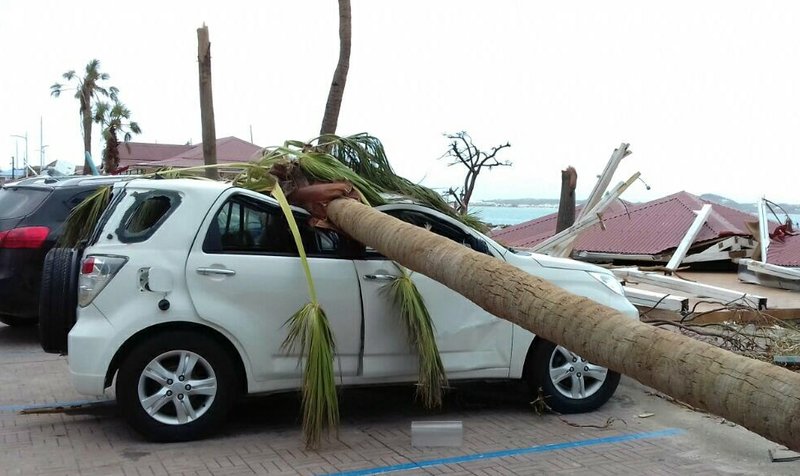MARIGOT, St. Martin -- In the chaotic days after Hurricane Irma smashed St. Martin, the storm also exposed simmering racial tensions on the island's French territory, with some black and mixed-race residents complaining that white tourists were given priority during the evacuation.
It was the type of anger that has long plagued France's far-flung former colonies -- especially its Caribbean territories, where most of the population identifies as black and is poorer than the white minority.
Johana Soudiagom was disturbed to find herself among a tiny handful of nonwhites evacuated by boat to nearby Guadeloupe after Irma devastated the island.
"It's selective. Excuse me, but we saw only mainlanders," she told Guadeloupe 1ere television, visibly shaken. "That's a way of saying, 'I'm sorry, only whites. There are only whites on the boat.'"
Click here for larger versions
Photos by The Associated Press
Photos by The Associated Press
It's common practice for tourists to be evacuated first from disaster zones for practical reasons, as they are staying in hotels and not in their homes and tend to have fewer resources such as food and vehicles. The French prime minister insisted Monday that the only people being prioritized were the most vulnerable.
Government spokesman Christophe Castaner said he understood islanders' frustration with the government response but blamed part of the controversy on their "emotional shock, an impact that's extremely hard psychologically."
Soudiagom and other witnesses told French Broadcaster Guadeloupe 1ere that the boat they took Friday carried tourists, including Americans, to safety but left many St. Martin residents behind, including needy mothers and children.
On Monday, France's Representative Council of Black Associations asked the government for a parliamentary inquiry, citing concerns that those who were evacuated were not "necessarily the most in distress."
[HURRICANE TRACKER: Follow Irma’s projected path]
"In my eyes, Irma is for the French Antilles what Hurricane Katrina was for Louisiana in the U.S. -- an exposer of racial and social inequalities," said the group's spokesman, Louis-Georges Tin.
The terror of facing down a Category 5 hurricane has combined with a long-held sense of isolation among residents of St. Martin, some 4,200 miles from the French mainland and popular with European tourists.
"The natural catastrophe occurred in a place that's very vulnerable socially, where there is a population of many different skin colors and a history of slavery," said Michel Giraud, a French researcher who writes on race. "Of course there will be a perception of racism."
The island of St. Martin -- divided in the 17th century into the French territory of Saint-Martin and the Dutch territory of Sint Maarten -- measures just 34 square miles.
The French part of St. Martin is similar to other French holdings in the Caribbean in that its white minority is generally wealthier than its black majority. Because France bans the collection of data on race, there are no statistics to show how much wealthier.
It began as a colony whose economy was fueled by African slaves. But after slavery was abolished in 1848, Tin said, "there were no reparations for the slaves, only for the slave owners," so the former slaves won freedom but remained destitute. "The economy is now based on tourism but it is still poor. The wages are significantly lower than the mainland France."
"In Florida, there were more than 1 million evacuated, and France says that with four days' notice they couldn't evacuate a much smaller number," Tin said. "The question must be asked: Does it have to do with racism?"
RELATED ARTICLES
http://www.arkansas…">Irma wanes; U.S. dead at 10http://www.arkansas…">Guardsmen file back from Texas
http://www.arkansas…">TV reporters ignore own advice to put storms' fury on air
http://www.arkansas…">For oil, bigger ill Harvey, not Irma
The government argues that it is more difficult to transport tens of thousands of people off small islands in stormy weather than it is to tell people to drive to safety.
A Section on 09/12/2017
